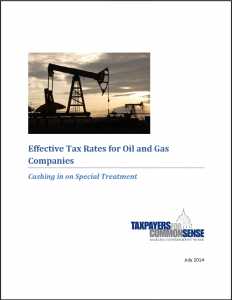According to a new report from Taxpayers for Common Sense, oil companies paid only 11.7 percent of the U.S. income in federal taxes over the last five years. This is compared to the statutory 35 percent corporate tax rate paid by other companies.
“This is a perfect example of how the oil industry is allowed to play by a different set of rules than everyone else,” commented Jeremy Funk, communications director with the  nonprofit organization Americans United for Change who supports choice at the pump through biofuels. “They can dodge billions of dollars in taxes, and Washington lets them get away with it. This is the same industry that is now fiercely lobbying the White House for yet another special interest favor: gutting the Renewable Fuel Standard and allowing more foreign oil into the U.S. gasoline supply at the expense of cleaner, cheaper renewable fuels made in America. Isn’t the system rigged enough in Big Oil’s favor without Washington helping them become a monopoly at the pump, too?”
nonprofit organization Americans United for Change who supports choice at the pump through biofuels. “They can dodge billions of dollars in taxes, and Washington lets them get away with it. This is the same industry that is now fiercely lobbying the White House for yet another special interest favor: gutting the Renewable Fuel Standard and allowing more foreign oil into the U.S. gasoline supply at the expense of cleaner, cheaper renewable fuels made in America. Isn’t the system rigged enough in Big Oil’s favor without Washington helping them become a monopoly at the pump, too?”
The country is still waiting the final rules from the Environmental Protection Agency (EPA) for the 2014 Renewable Fuel Standard (RFs) that if passed as proposed, would reduce the amount of domestically produced biofuels at the pump while increase foreign oil. Funk points out that gasoline costs more than renewable fuels such as ethanol, and the EPA proposal would cost Americans millions of dollars at the pump, ‘killing’ American jobs. Funk also said that because the EPA proposal effectively allows oil companies to block access to the marketplace by refusing to install fueling infrastructure for renewable fuels, it will be particularly devastating to America’s emerging advanced biofuel industry.
To achieve such a low current tax rate, oil companies were able to take advantage of special tax breaks and loopholes that allowed them to defer more than $17 billion in taxes they would have otherwise owed, explained Funk. One “small” oil company, Apache, earned $6 billion in profits between 2009 and 2013 but deferred its entire tax bill. Not only did the company avoid paying any taxes, but it actually reaped a tax benefit worth $220 million according to Funk.
The report concludes with a damning indictment of the oil industry’s deceitful rhetoric about its tax obligations:
“Oil and gas companies may pay a lot in income taxes, but it is not to the U.S. government. Indeed, the “current” federal income tax rate of some of the largest oil and gas companies – the amount they actually paid during the last five years – was 11.7 percent. The “smaller” companies included in the study which reported positive earnings only paid 3.7 percent. Many of the tax provisions available to the oil industry are not available to other taxpayers, giving these companies a significant tax advantage. The language the industry uses gives the impression that it pays a high federal income tax rate. The American Petroleum Institute cites an industry-wide effective tax rate of 44.3 percent. In reality, the amount oil and gas companies pay in federal income tax is considerably less than the statutory rate of 35 percent, thanks to the convoluted system of tax provisions allowing them to avoid and defer federal income taxes.”

